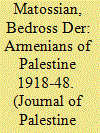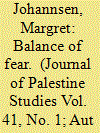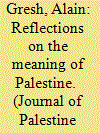|
|
|
Sort Order |
|
|
|
Items / Page
|
|
|
|
|
|
|
| Srl | Item |
| 1 |
ID:
108306


|
|
|
|
|
| Publication |
2011.
|
| Summary/Abstract |
For the Armenians of Palestine, the three decades of the Mandate were probably the most momentous in their fifteen hundred-year presence in the country. The period witnessed the community's profound transformation under the double impacts of Britain's Palestine policy and waves of destitute Armenian refugees fleeing the massacres in Anatolia. The article presents, against the background of late Ottoman rule, a comprehensive overview of the community, including the complexities and role of the religious hierarchy, the initially difficult encounter between the indigenous Armenians and the new refugee majority, their politics and associations, and their remarkable economic recovery. By the early 1940s, the Armenian community was at the peak of its success, only to be dealt a mortal blow by the 1948 war, from which it never recovered.
|
|
|
|
|
|
|
|
|
|
|
|
|
|
|
|
| 2 |
ID:
108310


|
|
|
|
|
| Publication |
2011.
|
| Summary/Abstract |
The specificity of the type of Holocaust denial on the rise in Arab countries since the 1980s is explored in contradistinction to Western Holocaust denial. The latter, rooted in anti-Semitism, is a substitute for open hatred of the Jews in countries where this hatred has not been tolerated since World War II. Holocaust denial in Arab countries, on the other hand, finds its roots in Israel's exploitation of the Holocaust for political purposes. It also serves as a simplistic explanation for Western support of the Zionist state and as an outlet for frustrations created by Israel's oppressive supremacy.
|
|
|
|
|
|
|
|
|
|
|
|
|
|
|
|
| 3 |
ID:
108307


|
|
|
|
|
| Publication |
2011.
|
| Summary/Abstract |
This article looks at the use of ultra-short-range rockets by Palestinian militant factions in the Gaza Strip as part of the overall dynamic of the Israeli-Palestinian conflict and as a tool employed within internal Palestinian rivalries. Against the background of the gross military asymmetry between the parties to the conflict, it assesses the strategic utility of the rockets, including their psychological value as an "equalizer" to Israeli attacks. The article scrutinizes Israel's options to counter the rocket threat and identifies steps toward containing violence in Gaza. While bearing in mind that several Palestinian militant groups are involved in the production, acquisition, and firing of rockets, this article focuses on Hamas because, due to its leadership role in the Gaza Strip, a solution for the rocket issue will not be found without factoring in and providing a role for the Islamic organization.
|
|
|
|
|
|
|
|
|
|
|
|
|
|
|
|
| 4 |
ID:
108305


|
|
|
|
|
| Publication |
2011.
|
| Summary/Abstract |
The Greek Orthodox Church in Palestine, the largest of the Christian denominations, had long been troubled by a conflict ("controversy") between its all-Greek hierarchy and its Arab laity hinging on Arab demands for a larger role in church affairs. At the beginning of the Mandate, community leaders, reacting to British official and Greek ecclesiastical cooperation with Zionism, formally established an Arab Orthodox movement based on the structures and rhetoric of the Palestinian nationalist movement, effectively fusing the two causes. The movement received widespread (though not total) community support, but by the mid-1940s was largely overtaken by events and did not survive the 1948 war. The controversy, however, continues to negatively impact the community to this day.
|
|
|
|
|
|
|
|
|
|
|
|
|
|
|
|
| 5 |
ID:
108308


|
|
|
|
|
| Publication |
2011.
|
| Summary/Abstract |
The Palestinian Authority's application to become a full member state at the United Nations represents the latest stage in its "alternative peace strategy" born of the collapse of the U.S.-sponsored Oslo peace process. But-argues the author-the new strategy remains overly dependent on diplomacy and uncertain Palestinian allies like the European Union. If it is to achieve a balance of power for future negotiations more favorable to the Palestinians, however, it will need to be anchored in a greater national consensus at home and in the diaspora, and allied more closely to the emerging democratic forces in the region.
|
|
|
|
|
|
|
|
|
|
|
|
|
|
|
|
| 6 |
ID:
108309


|
|
|
|
|
| Publication |
2011.
|
| Summary/Abstract |
This essay addresses the Palestine question within a European context. After reflecting on why Palestine has been widely embraced as a "universal cause," the author explores its relationship to the "Jewish question" in the changed context following World War II: Whereas prior to the war it was the Jews who were perceived as a threat to European civilization, today it is the Muslim immigrants who have the scapegoat role. Also discussed are philosemitism (and its manifestations in the West) and anti-Semitism (as it relates to the Arab world), and how these phenomena have been impacted by the ongoing Palestinian-Israeli conflict. The essay concludes with "utopian musings" on possibilities for a future Palestinian-Israeli peace.
|
|
|
|
|
|
|
|
|
|
|
|
|
|
|
|
|
|
|
|
|